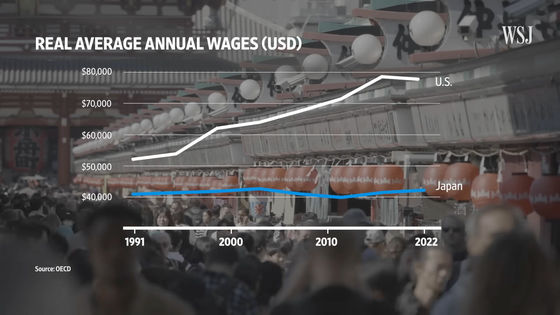Why has the Japanese economy continued to stagnate since the 1990s?

Japan, which was the world's third largest economic power, is set to lose its position to Germany in 2024. The Wall Street Journal (WSJ) explains why Japan is lagging behind economically, saying that 'Japan's strong traditionalism is a burden on the Japanese economy.'
Why Japan's Shrinking Economy Is Stuck in the '90s | WSJ - YouTube
Japan is often seen abroad as a 'land of innovation.' With a number of technologies leading the world, such as the bullet train and advanced robotics, 'it's no wonder people think of Japan as being at the cutting edge of technology,' says Peter Landers of the WSJ.

On the other hand, he also pointed out that Japan has a strong sense of traditionalism, which is hindering economic growth and causing the country to fall behind other countries.

Japan was once the world's third largest economy, but will lose that position to Germany in 2024. Randers analyzed the reason for Germany's loss of third place in the world as 'because Japan's economic growth and productivity have been slowing for decades.'

One of the reasons the Japanese economy is stagnating is because it 'remains dependent on old technology.' Landers cited the 'hanko' stamp, which is used instead of a signature on contracts, invoices, and official documents, as a prime example. Hanko, which has been used as a tool to prove identity for centuries, is still used in various aspects of daily life as of 2025. For example, Landers pointed out that hanko is used when opening a bank account or receiving a package by courier.

Arami Hideki, who has been working as a stamp craftsman since 1992, said, 'I believe that important things should be made more troublesome. The scary thing about the digital world is that it allows criminals to go out into the world.'

On the other hand, Landers points out, 'These practices may be reducing corporate productivity. Japan's productivity is about two-thirds that of the United States and three-quarters that of Germany. This is quite low, and the fact that this situation has continued for years is a problem.'

It is very difficult to balance efficient and productive methods with traditional and widely loved methods. As a result of failing to achieve this balance, Landers says Japan has become 'a country with a rich culture but one that is resistant to change.'

Economist Jesper Coll, who has lived in Japan since 1986, points out that in Japan, fax numbers are still included on business cards. Coll says of Japanese culture, 'The Japanese have become

Besides stamps, there are other cases where old customs still remain. 'Fax is still used frequently in Japanese companies, and important documents are almost always sent by fax rather than email,' says Landers.

'Japan was a very good country and
'In some ways, Japan hasn't changed much since the 1990s. Many workers still have lifetime employment and Japanese wage levels have remained almost unchanged for 30 years,' Landers said. 'Many Japanese people work long hours but productivity remains low.'

'Japan is incredibly labor intensive. Just go to a Starbucks in Japan. In the US, Starbucks has two employees taking an order and making a latte, but in Japan, it has at least five,' Coll said.

Regarding these practices in the Japanese work environment, Landers points out that 'Japan's strict work culture still prioritizes conformity over efficiency.'
However, this situation is gradually changing, and the person leading this trend is

In Japan, even when digital alternatives are available, traditional analog methods are often preferred. Coll points out that this is due to Japan's pedantic side that emphasizes form over content. Coll cited 'being an early adopter' and 'rapidly utilizing digital technology by adopting the latest technology' as the key to breaking away from this situation.

'Japan has always moved at its own pace and adopted the latest technology,' Landers said. 'So even though it may be stagnating economically, it has a unique culture and charm. But to reinvigorate its economy, it may need to shed some of its history.'
Related Posts:
in Video, Posted by logu_ii







